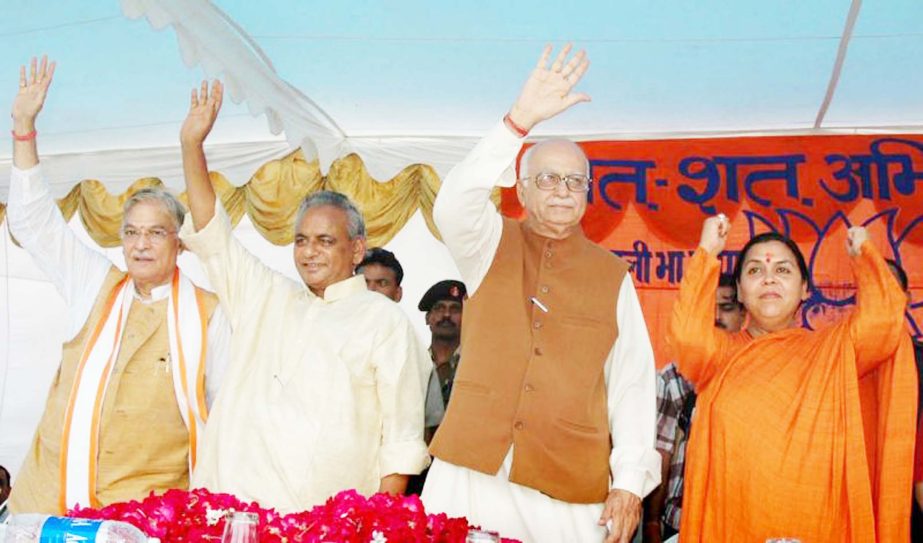
Reuters, New Delhi :
The Indian Supreme Court on Wednesday revived charges of criminal conspiracy against leaders of Prime Minister Narendra Modi’s Bharatiya Janata Party in two cases pertaining to the 1992 demolition of the Babri mosque, The Hindu reported.
The demolition of the mosque, located in the northern town of Ayodhya, triggered wide-scale religious riots that killed thousands, deepening divisions between Hindus and India’s large Muslim minority that remain today.
A two-member bench of the apex court comprising Justices P.C. Ghose and Rohinton F. Nariman revived the charges against veteran BJP leaders L.K. Advani, Murli Manohar Joshi and Modi’s water resources minister Uma Bharti for making inflammatory speeches that incited Hindus to tear down the 16th-century mosque.
The charges against the BJP leaders, brought by the Central Bureau of Investigation, date back more than a decade and were previously blocked by another court.
Charges against six other BJP and Sangh Parivar leaders were also revived. They had been accused of “giving provocative speeches that promoted enmity and threatened national integration” in the Rae Bareilly case.
Earlier this year, the Rae Bareilly case was clubbed together with the Lucknow case, which pertains to the actual demolition of the mosque and ensuing violence.
During Wednesday’s hearing, the apex court clarified that despite being clubbed together, the trial would be no de novo (initiated anew). Rather, the criminal conspiracy charges would be joined into one.
The SC also ordered a day-to-day trial of the case to be completed in two years – a decision that will be a blow to the BJP and revive debate about the brand of Hindu nationalism within Modi’s party.
During the hearing, the Indian SC also exempted Rajasthan Governor Kalyan Singh from facing trial, the daily added.
Singh, who was serving as chief minister of Uttar Pradesh at the time of the demolition of the mosque, is protected from criminal prosecution by the constitutional immunity granted to him as governor.
However, Justice Nariman maintained that the governor would be prosecuted “the moment he steps down”.
Modi has himself been dogged by questions over his Hindu nationalist ideology. He long faced allegations that he looked the other way or even encouraged Hindu mobs to go on a rampage against Muslims in Gujarat state, where he was chief minister in 2002, after a train carrying Hindu pilgrims was torched.
He denied the allegations and a Supreme Court-ordered inquiry absolved him of responsibility.
In 1992, Advani, a former home minister and chief of the BJP, had led Hindus on a pilgrimage that ended with the razing of the mosque. Photographs circulated at the time show politicians celebrating its destruction.
The BJP is committed to building a temple on the site of the mosque, which Hindus say is the birthplace of their god-king Rama, “within the framework of the constitution”.
The Indian Supreme Court on Wednesday revived charges of criminal conspiracy against leaders of Prime Minister Narendra Modi’s Bharatiya Janata Party in two cases pertaining to the 1992 demolition of the Babri mosque, The Hindu reported.
The demolition of the mosque, located in the northern town of Ayodhya, triggered wide-scale religious riots that killed thousands, deepening divisions between Hindus and India’s large Muslim minority that remain today.
A two-member bench of the apex court comprising Justices P.C. Ghose and Rohinton F. Nariman revived the charges against veteran BJP leaders L.K. Advani, Murli Manohar Joshi and Modi’s water resources minister Uma Bharti for making inflammatory speeches that incited Hindus to tear down the 16th-century mosque.
The charges against the BJP leaders, brought by the Central Bureau of Investigation, date back more than a decade and were previously blocked by another court.
Charges against six other BJP and Sangh Parivar leaders were also revived. They had been accused of “giving provocative speeches that promoted enmity and threatened national integration” in the Rae Bareilly case.
Earlier this year, the Rae Bareilly case was clubbed together with the Lucknow case, which pertains to the actual demolition of the mosque and ensuing violence.
During Wednesday’s hearing, the apex court clarified that despite being clubbed together, the trial would be no de novo (initiated anew). Rather, the criminal conspiracy charges would be joined into one.
The SC also ordered a day-to-day trial of the case to be completed in two years – a decision that will be a blow to the BJP and revive debate about the brand of Hindu nationalism within Modi’s party.
During the hearing, the Indian SC also exempted Rajasthan Governor Kalyan Singh from facing trial, the daily added.
Singh, who was serving as chief minister of Uttar Pradesh at the time of the demolition of the mosque, is protected from criminal prosecution by the constitutional immunity granted to him as governor.
However, Justice Nariman maintained that the governor would be prosecuted “the moment he steps down”.
Modi has himself been dogged by questions over his Hindu nationalist ideology. He long faced allegations that he looked the other way or even encouraged Hindu mobs to go on a rampage against Muslims in Gujarat state, where he was chief minister in 2002, after a train carrying Hindu pilgrims was torched.
He denied the allegations and a Supreme Court-ordered inquiry absolved him of responsibility.
In 1992, Advani, a former home minister and chief of the BJP, had led Hindus on a pilgrimage that ended with the razing of the mosque. Photographs circulated at the time show politicians celebrating its destruction.
The BJP is committed to building a temple on the site of the mosque, which Hindus say is the birthplace of their god-king Rama, “within the framework of the constitution”.

